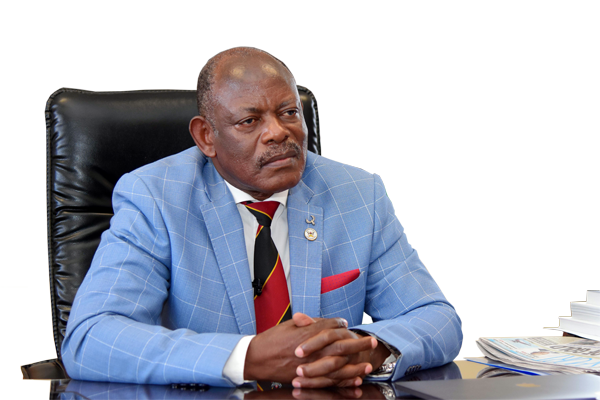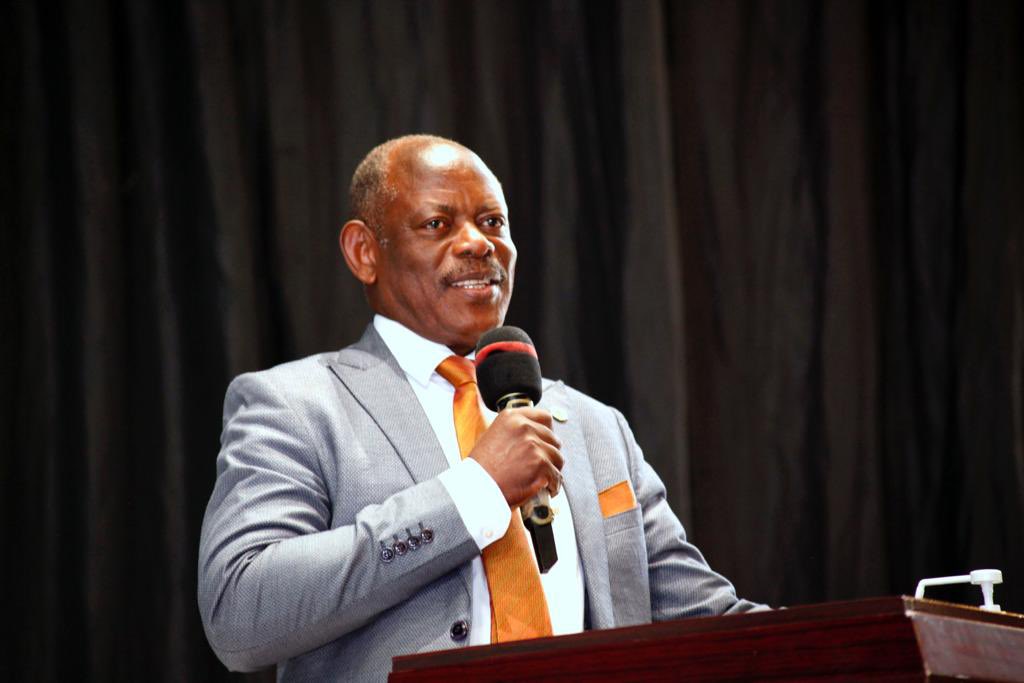Prime
Unease, despair at Makerere as Nawangwe eyes second term

Prof Banarbas Nawangwe
What you need to know:
- Despite protests from sections of academic and non-academic staff, the current vice chancellor reckons he is the best person to kick-start the institution’s next journey after his five-year contract expires on August 31.
For a century, Makerere University has beckoned hundreds of thousands of students from near and far through its hallowed gates.
The centennial activities have been ongoing since last October, and will climax on October 6, with a glitzy ceremony to be presided over by President Museveni and other heads of state—current and former—who went to the ivory tower.
Ex-presidents Joseph Kabila (DR Congo), Milton Obote (Uganda), as well as Benjamin Mkapa and Julius Nyerere (both Tanzania), and celebrated writers Ngugi Wa Thiongó (Kenya) and David Rubadiri (Malawi) are some of the university’s notable alumni on the long list.
“It is a big milestone for us,” Prof Barnabas Nawangwe, the university’s Vice Chancellor (VC), told Sunday Monitor in an interview.
After October 6, Prof Nawangwe told Sunday Monitor in a wide-ranging interview, that the university intends to use the next 100 years to position itself as a research-led institution, breaking ranks with a past that saw it put emphasis on human resource development.
Makerere has a rich history, having transformed from a College of the University of London to a world-class university. It has distinguished itself as an emerging centre of excellence in medicine, agricultural sciences and research, among other disciplines.
Appointment machinations?
Despite protests from sections of academic and non-academic staff, Prof Nawangwe reckons he is the best person to kick-start the institution’s next journey. His five-year contract as VC, however, expires on August 31, but he has since expressed interest in reappointment.
Amid the flurry of centenary celebrations is a palpable sense of apprehension and despair over the current university leadership—both management and the University Council, which oversees the former. The two organs are accused of tyranny, creating a toxic working environment, and mismanagement.
“You people saw the Main Building burning and thought that was it, but Makerere has been burning inside for the past five years,” one senior academic staff said.
The university’s three staff associations last week petitioned the University Council chairperson, Ms Lorna Magara, over the delay to search for a VC, six weeks to the expiry of the current office holder’s term of office. The delay, the associations noted, herald a possible reappointment of the current officer holder.
“There are covert, biased, disputed and clandestine methods of trying to evaluate the current vice chancellor to award him another contract well aware that he does not qualify for another contract, according to policy,” the July 14 petition reads.
At 66, under normal circumstances, Prof Nawangwe would be serving on a post-retirement contract[s], which are handed down to distinguished staff who clock 60. If he is given a second contract, as it is most likely, he will be 71 at the end of the second term.
Post retirement contracts are given to professors up to 70 years and associate professors up to 65 years. Insiders say there are ongoing manoeuvres to amend the university’s human resource manual to lift the age for post-retirement contract for a professor from 70 to 80 years.
Bad blood
From day one of his leadership, Prof Nawangwe cracked the whip and turned everything upside down, which put him on a collusion path with the staff—both academic and non-academic. The schisms are plain to see. The resentment is mutual.
“He is probably the most unpopular vice chancellor we have ever had,” another teaching staff noted.
To this, Prof Nawangwe responded: “You want me to start debating with custodians?”
He said: “Criminals look at things with one eye. For them, when things are done the way they think they shouldn’t be done, there is a problem.”
The list of combative issues at hand is long. A section of staff and non-academic staff talked to for this story over the last two months say the pliant vice chancellor and the University Council, respectively, are bad news for the country’s oldest university. One that is supposed to produce independent minded students, academicians and pundits, but the staff say that culture has been eroded—and is fading— over the last few years.
One academic staff, according to corroborated accounts, after appearing on a political talk show on one of the local television stations sometime last year during which debate centred on the untidy state of affairs in the country, received a text message from a senior official in administration subtly telling him “we are watching you.”
The staff say both management and Council want “everyone subdued.” They say meritocracy has long died and promotions are based on loyalty or for those who mind their business.
“The VC can give someone an acting contract using discretionary powers because meritocracy was diluted,” one staff member said.
Some otherwise presumed big-headed staff, who have clocked 60 years, have been denied post-retirement contracts. The notable names include Prof John Jean Barya, an expert on labour law in the country, whose only transgression, insiders say, is providing legal counsel to staff associations; Prof Felix Bareeba and Prof John Stevens Tenywa, experts in the College of Agriculture and Environmental Sciences; and Prof Wilfred Lugul of the Department of Philosophy.
Such staff, insiders say, are essential to stay on temporarily to, among others, complete supervising graduate students. Each department determines and recommend a critical staff for post-retirement contracts “but since employment has been vulgarised, management sits on the decisions, which means people cannot stay around while the desperate ones have to go knocking on doors.”
Other staff dismissed or suspended for this and that reasons, which insiders say is “victimisation by management, include Dr Deus Kamunyu, the former Makerere University Academic Staff Association (Muasa) chairperson; Mr Bennet Magara, the chairperson of the Makerere University Administrative Staff Association (Masa); Mr Joseph Kalema; Associate Prof Charles Niwagaba; Mr Charles Barugahare; Mr Allan Ochenge, and School of Social Sciences’ Dr Juma Okuku.
Asked whether he is on mission to subjugate staff as they claim, Prof Nawangwe said: “You know, when you are an undisciplined person, you see things through one lens. The people claiming so, those are undisciplined people; all those people going around signing documents have had a disciplinary case. So what did you expect them to say now that my term is coming to an end? So they think perhaps now is the right time to deal with me.”
Then there is a long list of top positions that have gone for months without substantive office holders for several reasons. The deputy vice chancellor for finance and administration, deputy university secretary, academic registrar, director of quality assurance, director of human resources, director of legal affairs, and deputy dean of students are being held by individuals in acting capacity.
But Prof Nawangwe reasons that the positions fell vacant “around more or less the same time” but the process to fill them is underway.
Curious dismissals
The director for legal and human resource positions were advertised thrice before suitable candidates were recruited mid last year—Mr Davis Malowa as director of human resource and Mr Javason Kamugisha as director for legal. Both commenced five-year contracts on June 1, 2021.
Mr Kamugisha’s probation, according to multiple sources, was to run until the end of November of 2021. It was extended for two months until February 2022, during which he scored 90 percent and management recommended him for confirmation.
But the appointments board extended the probation, one senior staff revealed, adding “the university did not have sufficient tools to appraise him.”
Then on May 4, he was handed a termination letter. The matter wound up in the university tribunal, with Mr Kamugisha alleging unfair termination and a list of illegalities.
The university appeals tribunal chaired by retired Justice Patrick Tabaro, in May, directed management not to fill nor advertise the two positions pending hearing of the matter. A decision is due next week on Wednesday.
Mr Kamugisha referred Sunday Monitor to his lawyer, while Mr Malowa was not readily available for comment on the matter. However, the staff talked to for this story said the duo pressed the wrong buttons.
“Kamugisha brought his idealism here. Moreover, he taught at law school for almost a decade before, but thought the place was still the same,” one non-academic staff said.
For long spells, some Makerere University lawyers and officials have been accused of conniving with external lawyers to fleece anywhere from millions to billions of shillings from the institution in dubious bills of costs. The university bursar was briefly detained in January last year in connection with the matter.
The State House Anti-Corruption Unit commenced investigation into the matter, but it remains unclear how far they went. Officials and lawyers reportedly crack deals, then the lawyers garnish the university accounts or other property until a quick settlement is reached.
“Some appointments board members were deliberately leading to the loss of university cases to share costs with litigants outside the university,” one former lawyer at the university told Sunday Monitor.
Mr Kamugisha is said to have started cleaning the house during his probation, which set him on a collusion path with the powers that be. Apparently, one source claimed, the new director for legal condensed a payment claim submitted by a Council member, whose firm does business with the university.
“He antagonised a Council member, that was his crime,” the source, a non-academic staff, said. “It is common knowledge the university has been losing and settling many cases but with officials and litigants sharing money.”
This maleficence is big business around town, and cuts across ministries, agencies, and departments involving top law firms, crafty lawyers, civil servants, and judicial officers.
The staff also pointed to a labyrinth of graft and sleaze involving Council members in influencing appointments, and procurement deals, among others.
Prof Nawangwe, however, dismissed the accusations, saying he has no time for naysayers.
“My interests are the interests of the university and the people of Uganda, who have a stake in the university,” he said.




